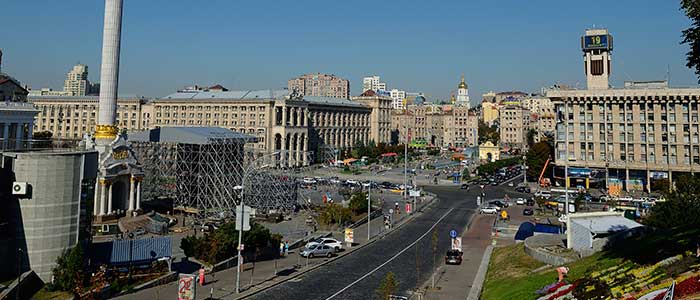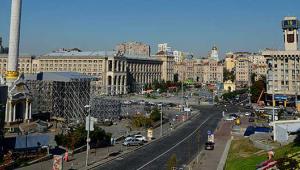Web_Ukraine_iStock_000078578589_Large.jpg

Independence Square in Kiev, Ukraine
The planned $5.5bn, of which $1bn was already released earlier this week, would form part of Ukraine’s massive $17.5bn bailout, agreed in 2015, which has since been dogged by the country’s slow pace of reform, political turmoil and conflict with Russia.
Frequent delays to the release of bailout cash have frustrated Ukraine’s struggle to recover from a deep recession, worth almost 16% of GDP.
Even the most recent $1bn disbursement, delivered on Monday, was originally due in March. The payment had to be put off in order for the fund to review the impact of the government’s economic blockade on the separatist region of Donbass – which has shaved 0.9% off the fund’s growth predictions.
Now, it’s the still-sluggish process of strengthening Ukraine’s anti-corruption apparatus and the government’s dawdling on pension reform that threaten to derail subsequent bailout releases.
Ron van Rooden, IMF mission chief for Ukraine, said Ukraine “cannot afford” to delay the latter any longer, in particular a hike to the retirement age.
“Further efforts are also needed to improve revenue administration and advance public administration reform as the size of government is still very large in regional comparisons,” he added.
Issues in Ukraine’s pension system are largely not an issue of benefit generosity; the benefits it provides are comparatively very low, equal to just over $2 per day. Rather, van Rooden explained, there are too many people receiving pensions relative to the number that are making social security contributions.
“[The] ratio is about 1:1, which is one of the worst ratios you can find in the world,” he noted, reflecting its low retirement age and generous early retirement options, the large number of beneficiaries, as well as the low level of contributions.
As a result, Ukraine has racked up the second largest pension deficit in Europe, at 6% of GDP. The IMF warned this would only worsen as the population ages and young people increasingly leave the country to work abroad.
As well as pension sustainability, the IMF is calling for fiscal measures worth 3-5% of GDP to achieve a budget surplus and help bring down debt. These include reductions in the wage bill, cuts to public sector employment and efficiency reforms.
Meanwhile, while the fund commended Ukraine for the establishment of anti-corruption institutions and an asset-disclosure programme, it said “tangible results” in convicting corrupt high-level officials and recovering proceeds from corruption have “yet to be achieved”.
While reforms so far have started to bear fruit – Ukraine has significantly cut its government deficit from 10% (when including state-owned enterprises) to 2% and the economy is growing again – the fund said the costs of Ukraine’s crisis have been substantial.
The continuing conflict in the country’s east continues to weigh on the economy. The blockade in Donbass prompted the IMF to cut its growth predictions for this year to 2%, while defence spending continues to take up much-needed resources.
A connected dispute with Russia over Ukraine defaulting on a eurobond held by its much larger neighbour also has implications for the IMF’s lending to Ukraine, which can only continue as long as IMF policies related to lending to countries in arrears are met.
“What the IMF executive board will need to see and need to assess at future reviews is whether these conditions... will continue to be met,” van Rooden said. “The board will need to make that assessment every time [it reviews Ukraine’s bailout].”












